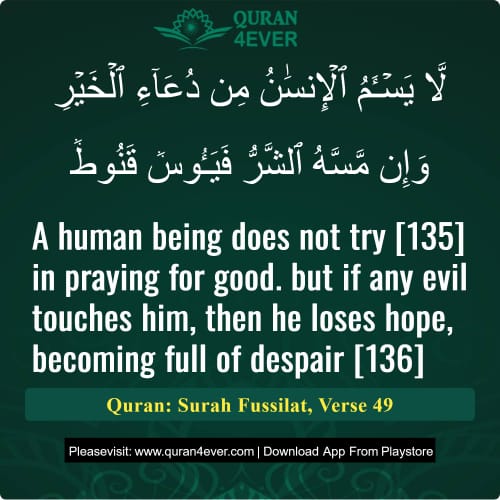
Transliteration:( Laa yas'amul insaanu min du'aaa'il khairi wa im massa hush sharru fa ya'oosun qanoot )
"A human being does not tire [135] in praying for good, but if any evil touches him, then he loses hope, becoming full of despair [136]."
The word "man" in this verse refers to the disbeliever, and "good" here denotes worldly possessions such as health, wealth, children, and status. It highlights the relentless greed of the disbeliever, who continuously seeks worldly gain, never satisfied with what he has. Though these things are called “good” in wording, they are, in reality, a trial or even a curse for those whose hearts are attached to them. The believer, by contrast, is content and sees the world merely as a temporary station.
When hardship or adversity strikes—such as illness, poverty, or loss—the disbeliever falls into despair and loses hope in Allah. Lacking firm faith, he quickly abandons patience, and in some cases, may even resort to extreme actions like suicide. In contrast, the true believer remains hopeful and reliant upon Allah, even in difficulty.
The best explanation of this verse is found in another verse of the Qur'an:
"Indeed, none despair of the mercy of Allah except the disbelieving people." (Surah Yusuf, 12:87)
This verse draws a sharp contrast between the fleeting mindset of the disbeliever and the enduring trust of the believer, highlighting the spiritual resilience that comes from true faith.
49. Man does not get tired of asking for good; but if an evil touches him, then he gives up all hope and is lost in despair. 50. And truly, if We give him a taste of mercy from Us, after some adversity has touched him, he is sure to say: “This is due to my (merit); I think not that the Hour will be established. But if I am brought back to my Lord, surely there will be for me the best with Him. “Then, We verily will show to the disbelievers what they have done, and We shall make them taste a severe torment. 51. And when We show favor to man, he turns away and becomes arrogant; but when evil touches him, then he has recourse to long supplications.
Allah tells us that man never gets bored of asking his Lord for good things, such as wealth, physical health, etc., but if evil touches him — i.e., trials and difficulties or poverty —
(then he gives up all hope and is lost in despair.), i.e., he thinks that he will never experience anything good again.
(And truly, if We give him a taste of mercy from Us, after some adversity has touched him, he is sure to say: “This is due to my (merit)…”) means, if something good happens to him or some provision comes to him after a period of difficulty, he says, `this is because of me, because I deserve this from my Lord.’
(I think not that the Hour will be established.) means, he does not believe that the Hour will come. So when he is given some blessing, he becomes careless, arrogant and ungrateful, as Allah says:
(Nay! Verily, man does transgress. Because he considers himself self-sufficient.) (96:6)
(But if I am brought back to my Lord, surely there will be for me the best with Him.) means, `if there is a Hereafter after all, then my Lord will be generous and kind to me just as He was in this world.’ So he expects Allah to do him favors in spite of his bad deeds and lack of certain faith. Allah says:
(Then, We verily will show to the disbelievers what they have done, and We shall make them taste a severe torment.) Thus Allah threatens punishment and vengeance to those whose conduct and belief is like that.
(And when We show favor to man, he turns away and becomes arrogant;) means, he turns away from doing acts of obedience and is too proud to obey the commands of Allah. This is like the Ayah:
(But ﴿Fir`awn﴾ turned away along with his hosts) (51:39).
(but when evil touches him,) means, difficulties,
(then he has recourse to long supplications.) means, he asks at length for one thing. Long supplications are those which are long on words and short on meaning. The opposite is concise speech which is brief but full of meaning. And Allah says:
(And when harm touches man, he invokes Us, lying on his side, or sitting or standing. But when We have removed his harm from him, he passes on as if he had never invoked Us for a harm that touched him!) (10:12)
(41:49) Man wearies not of praying for good,[65] but when evil visits him, he despairs and gives up all hope.
65. “For good”: For prosperity, abundance of provisions, good health, well-being of children, etc. And man here does not imply every human being for it also includes the prophet and the righteous people, who are free from this weakness as is being mentioned below. But here it implies the mean and shallow person who starts imploring God humbly when touched by harm and is beside himself with joy when he receives the good things of life as most human beings are involved in this weakness, it has been called a weakness of man.

For a faster and smoother experience,
install our mobile app now.
Related Ayat(Verses)/Topics